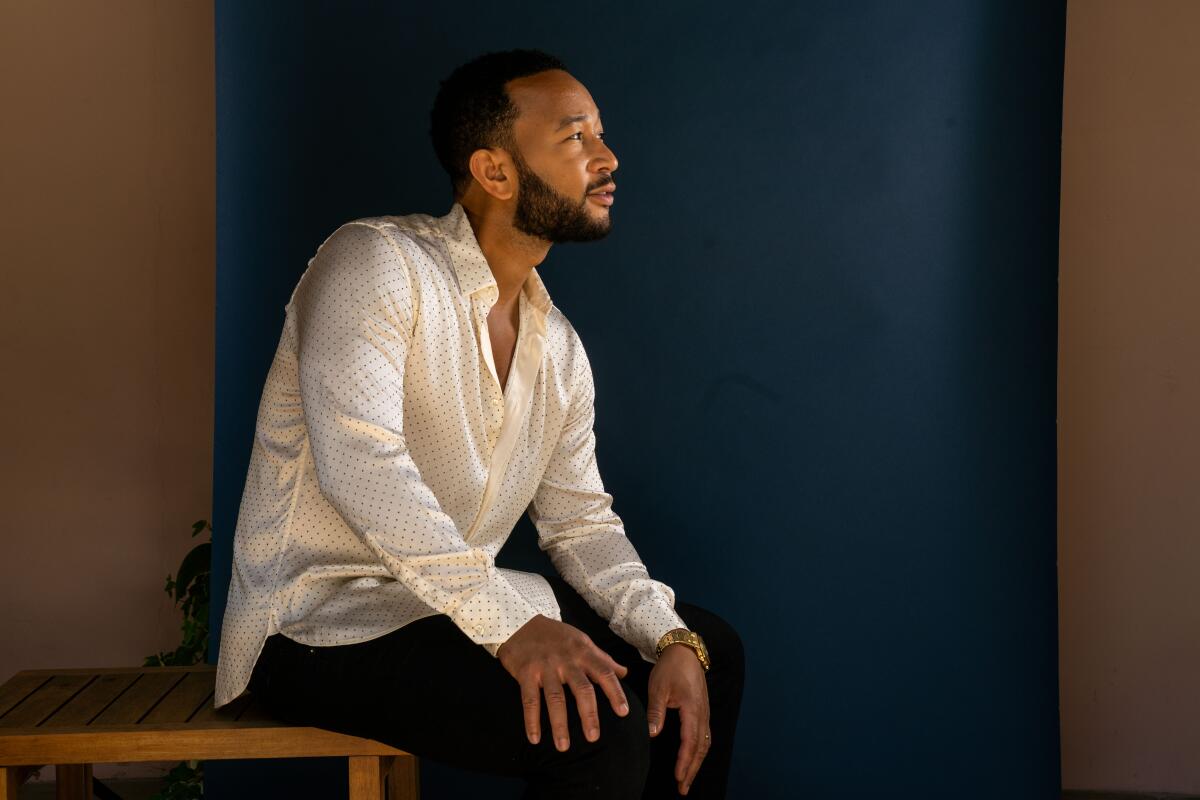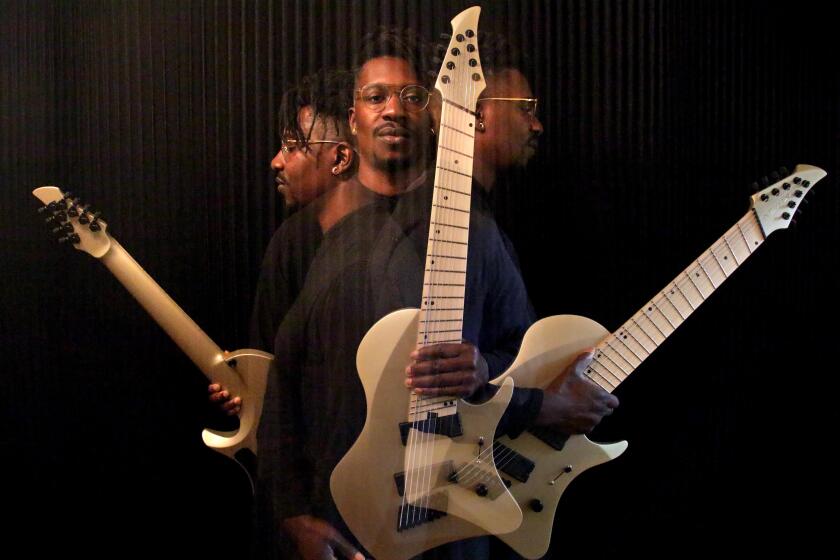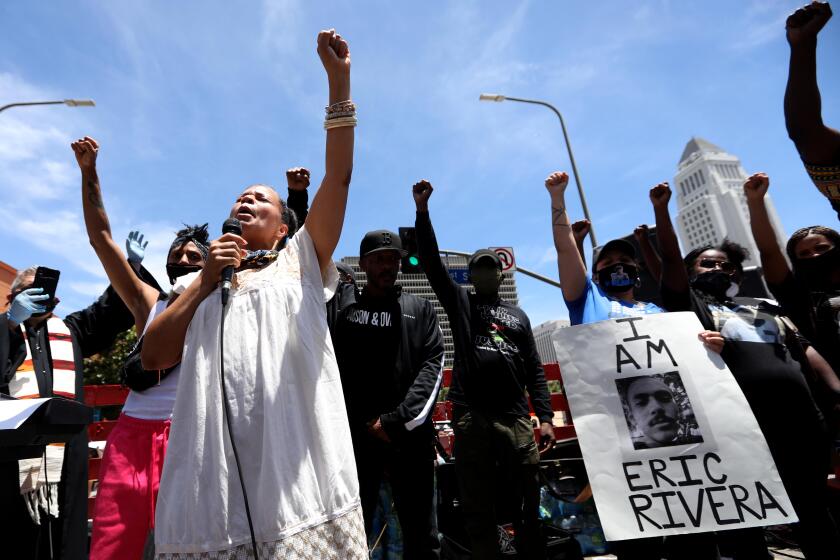John Legend on defunding the police, being Mr. Chrissy Teigen and why ‘hope is a strategy’

- Share via
The livestreamed songwriter showdown series Verzuz is typically full of good-natured boasting and roasting of opponents, but John Legend couldn’t help but turn his into a duet. When he sat at dueling pianos with his friend Alicia Keys on Friday afternoon — not coincidentally, on the Black American holiday of Juneteenth — the two began not with taunts, but a shared cover of Bob Marley’s “Redemption Song.”
“I feel like everyone’s learning right now,” Legend said later in the show, about the day when the last slaves in the U.S. finally learned of their freedom. “There are several moments you can call emancipation days for Black America. Juneteenth commemorates that they were always meant to be free, but in this nation, they weren’t. I’m so inspired watching people marching in these streets, for people marching in Selma [Ala.], marching in Ferguson [Mo.], trying to get more free.”
When Legend finished writing his newest album, “Bigger Love,” months ago, he didn’t expect it to land in the middle of the most incendiary moment for civil rights, police reform and reckonings around race in a generation — let alone during a deadly pandemic that has shut down the live music industry and claimed more than 100,000 American lives. “Bigger Love” is a mostly jubilant, sincere portrait of desire and devotion: the arc of a relationship and the shape and purpose it lends to life.

The album, released Friday, is not remotely tied to the news cycle, and to many that may be a balm in such turbulent times. But “Bigger Love” is powerful for its out-of-time qualities: an album about longing and connection, and why they’re worth fighting for. Especially right now.
“I know that the world is in a state of turmoil,” Legend said on a Zoom call with The Times last week before the album’s release. “We’ve got a pandemic raging in America. We’ve got our longstanding issues with racism and police violence. This is a weird time to put music out, but if I were going to put anything out at this moment, it would be this, the kind of lift that people could use right now.”
From a designer of far-out guitars to a club-music collective to a rapper-turned-vegan chef, here’s a guide to 27 diverse Black-owned music ventures
Legend, 41, is the bearer of an elusive EGOT (Emmy, Grammy, Oscar and Tony awards), and he’s one of the most broadly popular entertainers in the U.S. Since his debut playing piano on “The Miseducation of Lauryn Hill” through his rise as a writing partner with Kanye West and solo stardom in the mid-2000s, his mix of instrumental prowess, old-soul romanticism and deft ear for shifts in modern R&B and pop have never gone out of style.
In a different timeline, “Bigger Love” might well have been a thoughtful midcareer record about intimacy and its joys and trials that welcomed longtime fans to a new chapter of life. Curtis Mayfield and Marvin Gaye remain his north stars of inspiration, but guests like Jhené Aiko, Rapsody and the young Jamaican singer Koffee lend nimble and tropical touches that keep it very 2020. Legend’s voice, as smooth as a class of Calvados to wind down the evening, is again flawless. From the opener, “Ooh Laa” — kind of an echo of Beyoncé’s hammered-with-your-husband classic “Drunk in Love” — to “U Move I Move” and the downright lascivious “Favorite Place,” it’s a bedroom album first and foremost. But the LP’s second half is about getting locked out of that bedroom: the struggles of understanding a partner and trying to make sense of the world when love unravels.”Now you say you’re giving up / Took too much to build this house,” he sings on “Don’t Walk Away.” “I don’t want to sit and watch it burn down / I ain’t leaving, I ain’t giving you space.”
Legend, of course, is married to Chrissy Teigen, the model-actor-entrepreneur-activist and one of the most effortlessly hilarious people on the internet. They have two young children, Luna and Miles — the latter of whom crawled into Legend’s Zoom call and chattily waved to a Times reporter — and by all accounts are up there with Barack and Michelle Obama as the last hopes for love in a fallen world.
“She has a sense of wonder and adventure that really makes me enjoy being her husband and parenting with her,” Legend said. It’d be a mistake to read too much into their personal life from the album, though. “Bigger Love” is not “an autobiographical album about John and Chrissy and all the fights they’ve had. What I want to convey is, is a sense of honesty about how relationships play out and how they feel,” Legend said.
While he wanted to more vociferously defend her recently during her pained back-and-forth with New York Times food writer Alison Roman, over Roman’s criticisms of Teigen’s culinary business, “she does such a good job defending herself that she doesn’t need me to do it,” he laughed. “She’s the mayor of Twitter.”

Not even entertainment’s most aspirational power couple was prepared for the world that awaited the release “Bigger Love,” however.
Instead, America is closer to the breaking point than in any year since summer 1968, when civil rights leader the Rev. Martin Luther King Jr. and presidential hopeful Robert F. Kennedy were gunned down and the country was mired in an unpopular foreign war.
Legend has looked to that era before, on a 2010 collaborative album with the Roots, “Wake Up!” It was a covers album of civil rights and Black Power-era music from Donny Hathaway, Bill Withers and Nina Simone. While “Bigger Love’s” track list was locked months ago, Legend did sometimes wonder whether the present moment called for music — or at least a context — that spoke directly to the turmoil in the streets.
“I spent a lot of time thinking about how to introduce [this] album to people. I knew about the protests, and one angle was like, ‘Oh, we need to make fight the power songs and songs mourning our losses,’” Legend said. “But this was what I had in me over the last 18 months. I feel like that’s part of what it means to be fully human.”
“The issues that have finally received so much attention in recent weeks are ones that John has been fighting to address his entire adult life,” said Legend’s longtime manager, Ty Stiklorius. “But he also wants to remind us that even in troubled times, art can express complex emotions. The same album can inspire a date night or inspire us to join a protest march. The cultural shifts that are already underway since the death of George Floyd are fundamentally about loving each other, believing that someone else’s life is as valued as your own.”
With Melina Abdullah and Patrisse Cullors playing key roles, Black Lives Matter has transformed from a small but passionate movement into a cultural and political phenomenon.
Legend’s Oscar-winning track with Common, “Glory,” from the 2014 film “Selma,” was a pivotal moment in his career, when he more overtly made policing, civil rights and contemporary activism part of his agenda as an artist.
Ava DuVernay, director of “Selma” and the documentary and miniseries “The 13th” and “When They See Us,” respectively, said Legend’s popularity puts him in a crucial role to speak credibly about these issues to a huge audience.
“John is in a unique position culturally. He appeals across multiple disciplines with an acutely political voice to elevate marginalized people, and that’s critical,” DuVernay said.
“Art is how we tell the story. It’s how we power action beyond inspiration. Music gives you the actual direction on which way to go, to the core and beating heart of an issue. It may be static and cold in a law book, but when it’s brought to life in art, it’s emotionally propulsive.”
For Legend, issues around policing hit home in their particulars. His mother struggled with addiction, and she was incarcerated when Legend was a child in Ohio.
“When you hear people talking about defunding the police and decarceration, so many of them are saying, ‘There’s got to be a better way to deal with these issues,’” Legend said. “If you treat people with mental health and drug addiction issues like you truly care about their well-being and value their lives, you would know that jail is not the solution. What my mom needed back then wasn’t to get locked up. She needed help.
“If we spend the money on the front end, so that folks have a chance to succeed, then we don’t have to spend it on the back end, paying a bunch of cops and building a bunch of prisons and all these other things that are really expensive and destructive for our society.”

He’s heartened by the sense that finally, the changes Black people have been advocating for generations around policing seem to have hit a critical mass. Legend, a longtime Angeleno, endorsed reformer George Gascón in the heated race for district attorney in L.A. over the much-criticized incumbent Jackie Lacey, whose husband pulled a gun on Black Lives Matter protesters right before the primary election in March.
“We’ve come to the realization that these accounts from the police are almost never to be believed, particularly when they don’t admit any wrongdoing, because almost every single time it doesn’t match up with what’s on the camera,” Legend said. “Camera phones and social media have been a significant difference in this whole movement. These conversations and these uprisings have been happening for literally decades, and nobody believed us when we said this isn’t fair, we’re being abused, we’re being killed with no accountability. People didn’t believe us, and now they finally do because the proof is there.”
Legend specifically lauded Patrisse Cullors, the L.A. artist and organizer for Black Lives Matter, as someone who has been on these issues before they swept the nation’s media and will be there long after the smoke clears and the job remains. “These protests are very important, and they get a lot of media attention and have been really moving for the country,” he said. “But they start to kind of die down, and that’s when a lot of the work has to happen still.”
But no one can protest 24/7. Part of advocating for Black lives is fighting for the freedom to be fully human. “Bigger Love” is an album about love and home, and the comforts and lust and confusion they can bring. The protests on the streets around the world aspire to nothing less themselves.
“I think I’ve always been naturally optimistic,” Legend said. “I always try to find hope in every situation. Hope, I think, is not just kind of naivety and rose-colored glasses. I think hope is a strategy too.”
More to Read
The biggest entertainment stories
Get our big stories about Hollywood, film, television, music, arts, culture and more right in your inbox as soon as they publish.
You may occasionally receive promotional content from the Los Angeles Times.













